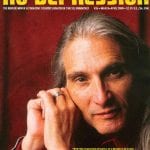Last Train Home – Those were the days
If this were 1972, Last Train Home would have a multi-album deal with a major like Warner Bros. or Columbia. But today, the subtleties of the band’s music — buttery harmonies, aching melodies flecked with homey strains of harmonica, mandolin and steel guitar — couldn’t be further out of fashion. Ditto the quiet desperation of the band’s lyrics, unpretentiously poetic meditations on life’s tremors that owe as much to the urgent melodrama of Jimmy Webb as to the writerly whimsy of Willis Alan Ramsey. In other words, 1972 revisited, and not the sort of thing that gets the attention of today’s SoundScan-conscious record execs.
“We’re definitely not working in a style that people perceive to be commercially viable,” admits frontman and principal songwriter Eric Brace. “If we really wanted to get signed, we would have some guy sampling some hip-hop beat behind us, get a mixmaster to liven things up a bit, and lie about our ages. It’s a youngsters’ game. Labels aren’t signing bands in their thirties.”
This isn’t to cast retro aspersions on Last Train Home’s unassuming country-rock — although one might be tempted to if the group’s playing, singing, and writing weren’t so damn felt — but rather to put it in context. As it is, their self-titled debut hit hard enough to earn them a Wammie (Washington Area Music Association Award) for Best Country Recording of 1998.
The group’s new album, True North, a record that plumbs the magnetic pull of the heart’s compass, is at once more muscular and multi-hued than its predecessor, including a turbocharged mountain breakdown, a Tijuana Brass cover, and a greasy slab of roadhouse rock. (Last Train Home also chipped in a swell version of “So Long Baby, Goodbye” to 1998’s Blastered: A Musical Tribute To The Blasters.)
All of the band’s music, says Brace, is born of a sensibility that he and his brother Alan, who plays mandolin, harmonica, and sings, developed while still in high school. Besides the Brace brothers, Last Train Home’s lineup consists of Bill Williams on guitars, Alan Enderson on keys, Kelly Willis & the Fireballs alum J. Carson Gray on bass, and Martin Lynds on drums and percussion.
“Back in the ’70s, D.C. had the greatest radio station in the world, WHFS-FM,” Brace enthuses. “It was a total indie and progressive station that would play Jesse Winchester and was the first commercial station in town to play the Sex Pistols. It was the first place we heard Willis Allan Ramsey and Little Feat, Bruce Cockburn and Elvis Costello. It was a musical education for a 15-year-old. Everything we’ve done comes out of listening to that station during that era.”




